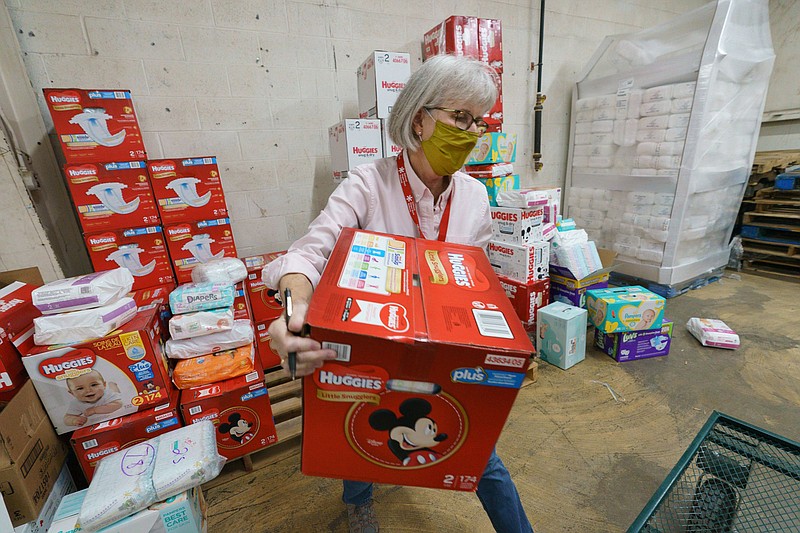PHILADELPHIA - Tania Sanchez fears running out of diapers.
They're a significant expense, calculated in her major monthly costs along with food and rent. And it's not as if her 6-month-old daughter will soon outgrow the $80 worth of Pampers she goes through every 30 days or so.
The pandemic has made a difficult situation infinitely harder.
"Diapers cost so much, and now we don't have the budget for it," said Sanchez, who stays home to take care of the baby and her 3-year-old son. Her husband's waiter job was slashed from 60 hours a week to 20 because of the coronavirus.
Sanchez now must rely on the Aquinas Center, a South Philadelphia nonprofit that supports the local community, for donated diapers.
"I'm so thankful," she said. "It would be so hard otherwise."
While it's common knowledge low-income families must apply for food stamps, stand in line at food pantries, and generally fight and fret to stay clothed, housed and insured during the time of COVID-19, many Americans don't realize how big a problem the lack of diapers poses.
"Oh, my gosh, need is growing," said Pat Kennedy, executive director and founder of the Greater Philadelphia Diaper Bank in Kensington, which supplies diapers to places such as the Aquinas Center.
Last year, the nonprofit distributed 820,000 in the Philadelphia area. Since the coronavirus took hold in March, however, and individuals began losing jobs, the diaper bank has given out 1.4 million, a number Kennedy expects will grow to more than 2 million by the end of the year.
Cradles to Crayons, a nonprofit that provides diapers and other items to low-income children, has already distributed 1 million diapers since the pandemic began, a period of time when it would normally disburse 650,000 disposables.
"People who never needed our help before have lost income because of the pandemic," said Kennedy, whose organization is completely volunteer-run. "I don't know when we're getting back to normal."
The rest of the nation is witnessing "unprecedented demand for diapers," according to Joanne Goldblum, chief executive officer of the National Diaper Bank Network, headquartered in New Haven, Connecticut.
The network distributes 64 million diapers annually to 200 member organizations, Kennedy's included. Each of those programs is giving away at least 50 percent more diapers since the pandemic started; some report increases of 400 percent or more.
Reliant on donations from diaper manufacturers as well as monetary contributions, Goldblum said her organization is still hoping that $200 million in emergency funding to support diaper distribution programs will be included in the COVID-19 relief package being negotiated in Washington. It is, Goldblum said, a bipartisan request led by Sens. Chris Murphy, D-Conn., and Joni Ernst, R-Iowa. Members of the House of Representatives are also looking for solutions, backing a continued push to pass the End Diaper Need Act of 2019. The bill would provide grants to diaper banks and similar organizations to distribute diapers to those in need.
For Dewi Liani, 33, of South Philadelphia, hard times are approaching, because she's running out of the enormous cache of diapers that generous friends gave her at the baby shower for her 8-month-old son.
Liani, who worked at the same printing company her husband does until the baby came, said the cost of diapers and baby wipes can be overwhelming. She doesn't want to put her son in day care for fear of COVID-19, so she stays at home with him, losing money.
"It's not like we have extra cash lying around," she said.
Not surprisingly, it's much cheaper to buy diapers in bulk, which low-income parents can't afford. So, instead of purchasing a 120-count box of Pampers for $31.10 on Amazon, many parents living in poverty are forced to buy single diapers for $1 at bodegas.
Because diapers are so dear, parents will often keep children in wet and soiled disposables for a long time - possibly even rinsing and reusing them, said Michal Smith, executive director of Cradles to Crayons, which also has agencies in Boston, Chicago, and New York City. Along with the rashes and urinary-tract infections children in used diapers suffer, there are other consequences, she said.
Uncomfortable children will fuss, and that, in turn, can incite child abuse from demoralized parents, Smith said. A Yale University School of Medicine study in 2017 found low-income mothers with diaper need have been known to develop depression.
Why not use cloth diapers?
Overall, just an estimated 5 percent of U.S. families do. Experts say it's unreasonable to expect those in poverty to live life differently than the rest of the culture, as though being poor means people should do without cellphones, air conditioning, television or disposable diapers.
Besides, cloth diapers have built-in obstacles.
Day care centers won't allow parents to drop off children without disposable diapers. That affects employment because many parents would be unable to work without day care.
Also, a family using cloth diapers would need a washer and dryer, and many low-income Americans don't own them. Beyond that, commercial laundries don't allow cloth diapers to be washed in their machines. And not many moms and dads have the time or inclination to clean cloth diapers in a bathtub or toilet, experts say.
Overall, lack of a sufficient supply of diapers is one more burden a low-income family bears. And the pandemic is yet another stressor added to the pile.
"During COVID, many of the stores in my neighborhood have had empty shelves in the diaper section," said Courtney Jenkins, 32, a mother of three in Northeast Philadelphia who works for an organization that helps people with behavioral issues.
For diapers, she's turned to the Philadelphia Interfaith Hospitality Network, a homelessness-prevention program that distributes the disposables it receives from the Philadelphia diaper bank.
Even with child support, Jenkins doesn't always have enough money to pay for what she needs. "Since me and the kids' father split, sometimes I have to choose between food and Pampers.
"Things can get scary without diapers."

